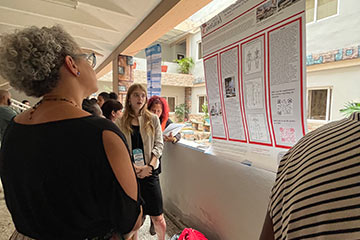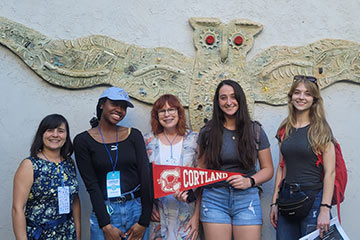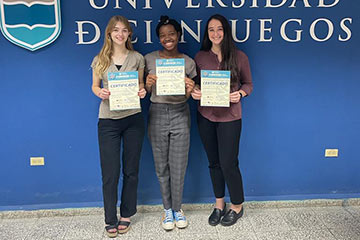
12/05/2023
Three SUNY Cortland students traveled to Cuba recently to present their undergraduate research efforts on urban redlining, identifying human remains and invasive jumping worms, marking the university’s first student visits to the communist island nation since the COVID-19 pandemic.
The Cortland group flew to the country for the 2nd Cienfuegos International Scientific Convention at Cuba’s Universidad de Cienfuegos. There, the students presented their Cortland research to a wider international audience.
The students selected to represent Cortland and their presented research were:
-
Madison Hodges, a junior geographic information systems major from New York City — Mapping Connections of Redlining on Urban Neighborhoods of New York. Hodges worked with Christopher Badurek, professor of Geography.
-
Caleigh Pfalzer, a senior anthropology major from Akron, N.Y. — Resolving Commingling and the Identification of Human Remains at the State University of New York at Cortland. Pfalzer worked with Kent M. Johnson, associate professor of sociology/anthropology.
-
Elizabeth Serafin, a senior biochemistry major from Oneonta, N.Y. — Temporal Dynamics of Invasive Jumping Worms. Serafin worked with Andrea Dávalos, associate professor of biological sciences, and Laura Eierman, associate professor of biological sciences.

Maria Timberlake, director of the Undergraduate Research Council (URC), co-managed the trip with Daniela Baban Hurrle, director of Cortland’s International Programs Office. Others in the travel group included students and faculty from Mississippi, Columbia University and University of California campuses.
“The trip was an eye-opening experience in many ways,” Serafin said. “I have traveled abroad before to countries like England and France, but Cuba was different, and not in bad way. I learned about the history, art, cuisine, traditions and economy of Cuba, which are all very different from the U.S. The initial purpose of going was to present my work, which I successfully accomplished with pride, but what I found there was so much more.
“I really experienced a different way of life from what I have always known. From that experience I gained new friendships and made connections with people of all different ages and backgrounds from around the world.”
The group arrived in Cuba on Monday morning and left the next Saturday. The students each got a $1,000 SUNY Global Learning for All Scholarship and other International Programs scholarships to offset their program fees and travel expenses.
Beyond the conference, students also had an opportunity to live with a Cuban host family, collaborate with various Cuban university students, experience the local cuisine, visit historic locations and play softball with Cuban baseball players.
Timberlake, who also presented at the conference on undergraduate research and barriers to students from underrepresented backgrounds, said that the first day there they were able to visit a botanical garden and artist studio and have a welcome dinner. The second day kicked off the research presentations. Pfalzer, whose work on identifying forensic remains was of particular interest to the Cuban university, was invited to present at an additional symposium of anthropology faculty.

This was the first time, according to Timberlake, that the Undergraduate Research Council worked on a trip like this with the university’s International Programs Office. After a successful experience, she expects there will be more.
“Cortland has so many good study abroad experiences and we were thinking about how we could incorporate undergraduate research a little more into those international partnerships. Study abroad often involves taking a class or getting credits for a course but seeing the students share their research in Cienfuegos inspired us to think more broadly at how the URC and International programs could collaborate.”
Ahead of the trip, there was a call for interested students to apply. Timberlake received four applications from students involved in the program. Originally, only two spots were expected to be available for the Cuba trip, but International Programs was able to secure enough funding for all four applicants, three of whom accepted.
This trip to Cuba was the first for Cortland since 2019, when the pandemic disrupted plans, and international travel programs were paused. It was Timberlake’s first time there.
“While students learned the techniques of crafting a research question, collecting and analyzing data in their specific discipline, the role of the URC was to assist the students in communicating their results with different audiences, learning from other undergraduate scholars, and experiencing research in a global context,” Timberlake said. “‘Make a difference in the world by engaging your intellect and curiosity through research’ is our guiding principle.”
SUNY Cortland has worked with colleagues in Cuba to develop educational and cultural exchanges since 2016. In 2017, SUNY Cortland President Erik J. Bitterbaum first visited the country with other faculty and administrators, and will return in February with Mary Schlarb, assistant vice provost for student achievement and senior international officer, to explore student opportunities.
This follows a recent invitation for Bitterbaum to join a SUNY meeting with a Cuban delegation hosted by Chancellor John B. King Jr. at the SUNY Global Center in New York City.
“I am so thrilled when our students and faculty have the opportunity to travel abroad, especially when the itinerary can include an experience like presenting research,” Bitterbaum said. “There is nothing quite like learning in a global classroom, and we will look forward to building similar international partnerships for many years to come.”